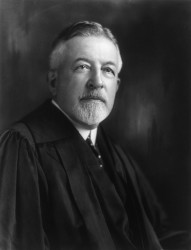Edward Terry Sanford, born and raised in Knoxville, is one of only six Tennesseans to have served on the Supreme Court of the United States (1923-30) and the only one with undergraduate degrees from the University of Tennessee. He has been described as “one of the more prominent and personable Tennesseans of his time” and Knoxville’s “most illustrious son.” On August 23, 2018, beginning at 6 p.m., Stephanie L. Slater, law clerk to the Honorable John W. McClarty of the Tennessee Court of Appeals, will give a presentation and sign copies of her recently published book about Justice Sanford at the East Tennessee Historical Society in downtown Knoxville.
Slater, who has worked for Judge McClarty for his entire tenure on the Court of Appeals, is a three-time graduate of the University of Tennessee and, with the exception of a stint in private practice, has worked in the state and federal court systems in Tennessee since obtaining her law degree in 1990. She currently works in the very building where she first viewed the portrait of Justice Sanford that inspired her to write about him.
“When I worked for the United States District Court for the Eastern District of Tennessee in the former courthouse, it hung behind the bench in the main courtroom,” Slater said. “Justice Sanford was the only judge from the district who had reached the lofty heights of the United States Supreme Court so his portrait hung in that place of honor.”
Now that the Tennessee Supreme Court, Court of Appeals, and Court of Criminal Appeals occupy the historic federal courthouse in Knoxville, the Seal of the Judiciary of the State of Tennessee hangs where the portrait once hung.
After obtaining his law degree from Harvard and returning to Knoxville to practice law, Justice Sanford lectured on federal procedure and corporation law in what was known then as the “law department” of the University of Tennessee. Justice Sanford, a student of history and noted historian, also taught classes on the history of the State of Tennessee in the undergraduate department, Slater said. Justice Sanford further served twice as the university’s alumni association president and on the board of trustees. Yet Justice Sanford’s devotion to the cause of education did not only extend to the University of Tennessee, as he served on the executive committee of the Conference on Education in the South and was a trustee with the George Peabody College for Teachers in Nashville.
A successful tenure with the Department of Justice resulted in Justice Sanford’s elevation to the judgeship of the Eastern and Middle Districts of Tennessee. For fifteen years, from 1908 to 1923, served only by a stenographer, Judge Sanford sat at Greeneville, Knoxville, Nashville, Chattanooga, and Cookeville.
“Despite a workload that was impossible for one judge to effectively address, Sanford gained a reputation as a lenient, thorough, and impartial judge,” Slater said.
A letter in support of his elevation to the United States Supreme Court relates the esteem in which Justice Sanford was held in the state: “Without the slightest regard to party affiliations, the people of this State are behind Judge Sanford’s application. The Democrats will be as well satisfied with his appointment as if he were one of them. . . . Every citizen who has served as a juror, every litigant and every lawyer who has been in any of his numerous terms of Court, is a better American citizen today than he was before for this experience. . . .”
After gaining the seat on the high court, Justice Sanford’s greatest impact came in the area of civil liberties, as his decision for the Court in Gitlow v. New York is recognized by many as the beginning of the process of incorporating the guarantees of the Bill of Rights and making them applicable to the states through the Fourteenth Amendment’s due process clause. Prior to the decision, the Supreme Court had consistently ruled that the Bill of Rights applied only to federal acts. Now, protections such as freedom of speech and the press, the right to counsel in criminal cases, freedom of assembly, the right against unreasonable search and seizure, the right to privacy, and so on, are extended to the states.



